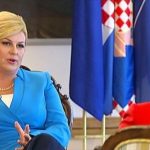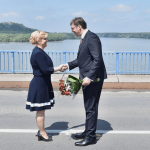ZAGREB, April 25, 2018 – Politicians in Croatia and Serbia have to show that they are responsible and mature enough not to be drawn into a spiral of verbal violence and continue on the path of dialogue for the benefit of both peoples, President Grabar-Kitarović said on Tuesday, assessing that positive changes have already occurred.
Relations with Serbia have become strained again after an incident caused by convicted war criminal Vojislav Šešelj during a visit by a Croatian parliamentary delegation to Belgrade, which was followed by an act of provocation by Serbian Defence Minister Aleksandar Vulin that prompted Croatian authorities to name him a persona non grata, to which Serbian President Aleksandar Vučić said that Serbia would respond in kind.
“It is up to us politicians to show that we are responsible and mature enough to avoid entering into a spiral of verbal violence,” Grabar-Kitarović said in an interview with Croatian Radio, describing as an omission that “no one” in Serbia had apologised for Šešelj’s outburst.
There are “positive changes” and they have been achieved since President Vučić’s visit to Croatia, she said and added that she would continue working on preparations for her visit to Serbia.
Speaking of the positive changes, Grabar-Kitarović cited a meeting between the two countries’ justice and transport ministers and recalled that she had received representatives of the families of Serbs gone missing in Croatia during the 1990s war and that Vučić had done the same and expressed readiness for dialogue on several occasions.
Grabar-Kitarović said that during her visit to Šibenik-Knin County last week she met with local Serbs who told her that they “can finally breathe” and felt better as well as that they hoped the positive developments would continue.
The representative of the Croat minority in Vojvodina, Serbia, Tomislav Žigmanov, has made a similar statement, she added.
Despite Šešelj’s outburst, the Croatian Chamber of Commerce opened its office in Belgrade, she said.
Despite disputes, we need to show the European Union and the entire world that we are cooperating in the spirit of good neighbourly relations and mutual respect, she said. The president repeated her earlier position that Vulin and Šešelj “are Serbia’s internal issue” which Serbia had to resolve because “they cause harm to its international reputation.”
Šešelj is a convicted war criminal, among other things he was convicted for the expulsion of Croats from Vojvodina, but statements made by Vulin carry much more weight because he is a government official, the defence minister and everything he says is interpreted in an entirely different way, said Grabar-Kitarović. “When someone questions Croatia’s sovereignty, you have to respond in such a way to defend the country’s dignity and integrity,” said Grabar-Kitarović.
For a long time work has been underway on concrete measures designed to help resolve outstanding issues between the two countries including the painful issue of the missing persons, the protection of minorities – the Croat minority in Serbia and the Serb minority in Croatia, and the issue of universal jurisdiction Serbia has been applying, she said. Both countries have to care for minorities, that is “our mutual responsibility”, and resolving outstanding issues in that area takes not only dialogue but also a sincere wish to resolve those issues, she said.
The issue of the WWII Ustasha concentration camp in Jasenovac has been a bone of contention between Croatia and Serbia over the past few years. Croatia’s Jewish and Serb communities, too, are accusing Croatian authorities of downplaying Ustasha crimes, which is why they have been boycotting the annual central state commemoration of the camp’s victims and commemorating the victims on their own.
For those disputes to be resolved it is necessary to establish a joint commission that would consist of representatives of the Serbs and Croats and Jews as well as foreign experts, the president said.
Asked about the construction of the Pelješac Bridge, which is causing tension with neighbouring Bosnia and Herzegovina, the president said there was no reason for that. “Croatia will absolutely respect all provisions of the Convention on the Law of the Sea,” she said.









